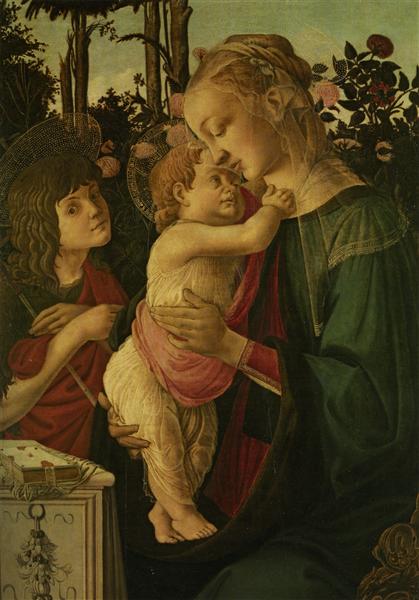描述
Sandro Botticelli's "The Madonna and Child with the Infant Saint John the Baptist," created in the 1480s, stands as a prominent example of the Florentine Renaissance, where the fusion of spirituality and humanism is especially palpable. Known for his distinctive style that combines gentle elegance with rich symbolism, Botticelli presents the Virgin Mary, the infant Jesus, and the infant Saint John the Baptist in this painting in a composition that radiates tenderness and emotional connection.
At first glance, the viewer is captivated by the triangular arrangement of the figures, a compositional convention that suggests stability and harmony. The Virgin, depicted with a serene and maternal face, holds the infant Jesus on her lap. Her gaze, soft and contemplative, directs the viewer's attention to the child, who is shown with a gesture of curiosity and wonder, suggesting the divine nature of his being, as well as his palpable connection with humanity through his childlike expression.
The infant Saint John the Baptist, positioned on the left, is presented as a crucial element that unites the two central figures. In this context, Saint John is commonly interpreted as the precursor of Christ, and his presence in the work symbolizes not only his biological relationship to Jesus, but also his prophetic role. This child, with his tanned skin and curly hair, wears a simple camel-skin tunic, a symbol of his ascetic life and future mission in the world. The expression on his face, which mixes innocence and slight wonder, adds another layer of emotional depth to the scene.
The colours used by Botticelli are characteristic of his vibrant palette, with a masterful use of contrast and softness. Warm, earthy tones predominate, creating an intimate and familiar atmosphere. The Madonna's deep blue vestments and red cloak not only allude to her divine status, but also evoke a sense of protection towards the child she cares for. This colour combination not only highlights the sacred character of the characters, but also contrasts with the softer, more natural hues of the children, creating a visual balance that is sublime.
In the background, the landscape, although a relatively discrete component, adds a dimension of serenity to the work. The gentle hills and trees that loom in the background provide a sense of space and place, preventing the image from feeling enclosed, and suggesting the idea of a connection between the heavenly and the earthly.
This painting is a reflection of Botticelli's Renaissance ideal, which seeks to express not only visual beauty, but also a spiritual depth. His focus on subtle emotions and human relationships is one of the most notable aspects that set him apart in his time, standing out among contemporaries such as Leonardo da Vinci and Michelangelo, who adopted more dynamic and technically innovative approaches in their own works.
While there are thematic similarities in other Botticelli works, such as The Adoration of the Magi, The Madonna and Child with the Infant Saint John the Baptist is distinguished by its intimate atmosphere and contemplation of motherhood, a theme Botticelli explored recurrently, but which in this painting achieves a particular emotional resonance. Not only does this work depict a moment of tenderness between mother and child, but it also encapsulates a broader connection with humanity through the figure of Saint John, posing this work in transition between the divine and the human, a visual poem that continues to dazzle art lovers to this day.
KUADROS ©, a famous painting on your wall.
Hand-made oil painting reproductions, with the quality of professional artists and the distinctive seal of KUADROS ©.
Painting reproduction service with satisfaction guarantee. If you are not completely satisfied with the replica of your painting, we will refund 100% of your money.

